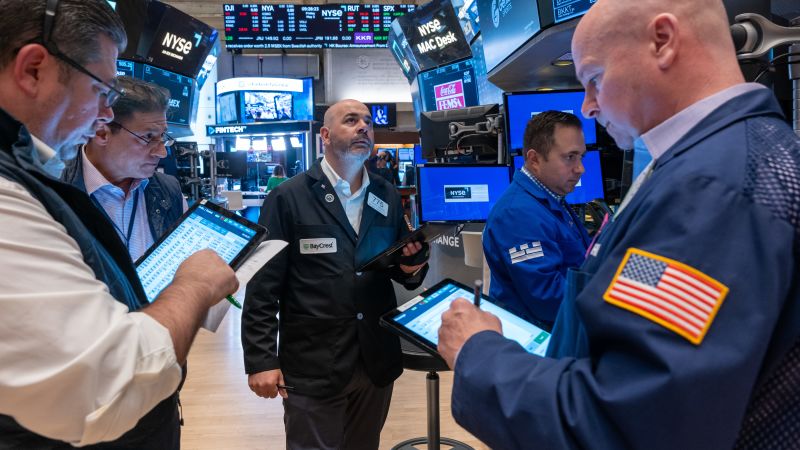A version of this story first appeared in CNN Business’ Before the Bell newsletter. Not a subscriber? You can sign up right here. You can listen to an audio version of the newsletter by clicking the same link.
Buying or selling a stock is about to get a lot snappier starting next Tuesday. But that doesn’t mean it’ll get smoother, at least right away — and some financial firms are preparing to handle any possible bumpiness.
The current standard settlement cycle for broker-dealer transactions is “T+2.” That means that it takes two business days from when you buy a stock to when that transaction “settles,” or when the stock is officially transferred to the buyer’s account and cash is delivered to the seller’s account. That’s been the norm since 2017.
Starting May 28, that cycle will take just one business day, or “T+1.”
“For everyday investors who sell their stock on a Monday, shortening the settlement cycle will allow them to get their money on Tuesday,” Gary Gensler, chair of the Securities and Exchange Commission, said in a press release. “It will make our market plumbing more resilient, timely and orderly.”
These new rules will apply to stocks, bonds, municipal securities, exchange-traded funds, some mutual funds and limited partnerships that trade on an exchange. Broker-dealers and registered investment advisors will also have to follow new recordkeeping rules.
Some investors say that a shorter cycle should help free up more liquidity in the market and reduce volatility in margins — the collateral traders have to show — since it reduces the chance of default before the transaction goes through. Clearinghouses, which sit between buyers and sellers, collect margins from traders as evidence that they can afford to make the transaction.
“Assuming everything goes well and we don’t see any hiccups, the move towards T+1 will be an overall benefit to our ecosystem, institutional investors and retail [investors],” said Rich Lee, head of program trading and execution strategy at Baird.
Baird has had a T+1 committee in place since last summer to ensure such hiccups don’t happen, Lee said. Employees have been in discussions with clients about how to assist them through the process. The company has also staffed up to handle their part in clearing trades with a shorter time frame.
The shortened settlement cycle is partly in response to the 2021 meme stock frenzy, when investors on Reddit sent shares of GameStop and AMC Entertainment soaring to eye-popping heights in a short span of time. (Meme stocks typically trade less on fundamentals and more on social media frenzy.)
Robinhood in 2021 temporarily suspended trading of GameStop, AMC and other stocks on its platform, blaming in part the T+2 rule that pushed up collateral requirements imposed on brokers like Robinhood. Investors were left waiting for their trades and brokers with their cash locked up until the settlement, unable to allow more purchasing to ensure they had enough funds to cover the trades.
“The existing two-day period to settle trades exposes investors and the industry to unnecessary risk and is ripe for change,” Robinhood CEO Vlad Tenev said in a February 2021 release. “There is no reason why the greatest financial system the world has ever seen cannot settle trades in real time.”
Boeing will present its plan to fix quality problems with its assembly line to US regulators next week, the company said Thursday.
The plan was ordered up by the Federal Aviation Administration in late February after a hole blew open in the side of an airborne 737 Max a month earlier, reports my colleague Gregory Wallace.
The FAA said it audited the production line at Boeing and its key 737 Max supplier and found “multiple instances where the companies allegedly failed to comply with manufacturing quality control requirements.” It gave Boeing 90 days to present a plan — and that deadline is next week.
Boeing chief financial officer Brian West said Thursday that Boeing and the FAA have had “lots of dialogue” including two check-ins during the preparation of the plan.
“The engagement is constructive,” he said at a conference organized by Wolfe Research on Thursday. “I expect next week we’re going to get some good feedback.”
FAA Administrator Mike Whitaker said separately on Thursday that the plan is “not the end of the process, it’s the beginning.”
“It’s going to be a long road to get back to where they need to be making safe airplanes,” Whitaker said in an interview on ABC News.
Read more here.
Meta this week appointed a group of outside advisors to provide guidance on its artificial intelligence strategy. The four-person advisory group is composed entirely of White men, reports my colleague Clare Duffy.
The tech giant said the group, which includes tech entrepreneurs and investors, will periodically consult with Meta’s management “on strategic opportunities related to our technology and product roadmap.” The move comes as Meta plans to invest tens of billions of dollars this year in AI infrastructure, research and product development.
The council includes Patrick Collison, the co-founder and chief executive of financial technology company Stripe; Nat Friedman, the tech investor and former CEO of GitHub; Tobi Lütke, the founder and CEO of online shopping firm Shopify; and Charlie Songhurst, the tech investor who formerly led corporate strategy and drove several key acquisitions at Microsoft. A Meta spokesperson confirmed the group will not be paid.
Despite the group’s significant combined experience, Meta is already taking heat for failing to include women or people of color — or anyone else outside of the wealthy, White, male, Silicon Valley mold — in a group advising one of the world’s most powerful tech companies on a revolutionary new technology. The members of the group are also all in their 30s or 40s.
The situation mirrors an incident last year at OpenAI when, in the wake of a leadership shakeup, it came under fire for appointing a board composed entirely of White men. Months later, OpenAI added three women directors to the board.
Read more here.
Read the full article here




